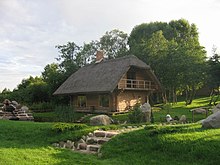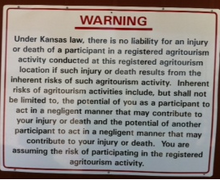Agritourism




Agritourism or agrotourism, as it is defined most broadly, involves any agriculturally based operation or activity that brings visitors to a farm or ranch. Agritourism has different definitions in different parts of the world, and sometimes refers specifically to farm stays, as in Italy. Elsewhere, agritourism includes a wide variety of activities, including buying produce direct from a farm stand, navigating a corn maze, slopping hogs, picking fruit, feeding animals, or staying at a bed and breakfast (B&B) on a farm.[1]
Agritourism is a form of niche tourism that is considered a growth industry in many parts of the world, including Australia,[2] Canada,[3] the United States,[4] and the Philippines.[5] Other terms associated with agritourism are "agritainment", "value added products", "farm direct marketing" and "sustainable agriculture".
Agritourism in the United States
Agritourism is widespread in the United States.[6] Agritourists can choose from a wide range of activities that include picking fruits and vegetables, riding horses, tasting honey, learning about wine and cheesemaking, or shopping in farm gift shops and farm stands for local and regional produce or hand-crafted gifts.
According to the USDA Cooperative State, Education and Extension Service, "Tourism is becoming increasingly important to the U.S. economy. A conservative estimate from the Federal Reserve Board in Kansas, based on 2000 data, shows that basic travel and tourism industries accounted for 3.6 percent of all U.S. employment. Even more telling, data from the Travel Industry Association of America indicate that 1 out of every 18 people in the U.S. has a job directly resulting from travel expenditures".[7][8][9]
Through the Small Farm Center at the University of California, "Agricultural tourism or agritourism, is one alternative for improving the incomes and potential economic viability of small farms and rural communities. Some forms of agritourism enterprises are well developed in California, including fairs and festivals. Other possibilities still offer potential for development".[10] The UC Small Farm Center has developed a California Agritourism Database that "provides visitors and potential entrepreneurs with information about existing agritourism locations throughout the state".[11]
The publication Promoting Tourism in Rural America explains the need for planning and marketing a rural community and weighing the pros and cons of tourism. According to the publication, local citizen participation is helpful and should be included in starting any kind of a tourism program. Citizen participation in planning tourism can contribute to building a successful program that enhances the community.[12] Additional websites that promote and publicize agritourism in the United States include Rural Bounty,[6] founded by agritourism consultant Jane Eckert, Farm Stay U.S.,[13] a nationwide directory of farm stays, and The Farm Stay Project,[4] a blog that profiles farm stays and tracks agritourism news.
Public awareness
People have become more interested in how their food is produced. They want to meet farmers and processors and talk with them about what goes into food production.[14] For many people who visit farms, especially children, the visit marks the first time they see the source of their food, be it a dairy cow, an ear of corn growing in a field, or an apple they can pick right off a tree.[14]
Farmers and ranchers use this interest to develop traffic at their farm or ranch, and interest in the quality of their products, as well as awareness of their products.[15]
Agritourism in other countries
Switzerland
- Jucker Farm in Seegräben, canton of Zürich
Italy
The country-hotel scene has come on apace since 1960, when the Michelin guide to Italy listed not a single establishment in the Chianti area. But even after the boom in rural accommodation in the 1970s, 1980s and 1990s, the choice was still limited, by and large, to basic agriturismo farm-holiday places or rather stuffy country-house hotels. The past few years have seen the arrival of a handful of stylish luxury spa resorts, and some welcome mid-range options where guests benefit from a hands-on, personal approach. These mini-resorts - which include La Bandita (Tuscany),[16] Prati Palai (Veneto - Lake Garda)[17] and Hotelito Lupaia (Tuscany) - are proof that, even in Italy, it is possible to run a classy rural retreat and charge less than £250 a night for a standard double in mid-season.[18]
Since 1985 agritourism in Italy is formally regulated by a state law,[19] emended in 2006.[20] The law states basic requirements to claim the title of "agriturismo", and delegates single regions to further regulate the matter.
India
Since 2004 Agriculture Tourism is operational, it started in Baramati Agri Tourism Center under the guidance of Pandurang Taware who is known as Father of Agri Tourism Concept in India. He received the National Tourism Award from the President Of India, for the most innovative Tourism Product. Agri Tourism India (ATDC) is pioneer in the development and marketing of agri tourism concept in India. ATDC, as of 2014, has 218 affiliated farmers and operates agri tourism center in their respective villages in the state of Maharashtra.
Turkey
In the province of Hatay, The village of Vakifli has a small eco and cultural tourism industry, as it is often touted as the last rural Armenian village in Turkey. The small village has a guest house where visitors can buy organic produce and see the life of the village. There is potential for ecotourism in the Aegean area of Western turkey as well, and is a growing industry there.
Dude ranches
Dude (or guest) ranches offer tourists the chance to work on cattle ranches, and sometimes participate in cattle drives. The fact sheet, Promoting the Farm and Ranch Recreation Business, gives farmers and ranchers information on marketing and developing strategies to win tourism dollars.[21] Dude ranches are common in the United States and Australian Outback.
See also
References
- ^ Biuso, Emily (November 23, 2007). "Down on the Farm With Your Sleeves Rolled Up". New York Times. Retrieved 2009-07-04.
Though most agritourists simply spend an afternoon visiting farm stands, picking fruit, or feeding animals, others might stay on a farm for several days. Depending on the farm, they might have the opportunity to help with farm or ranch chores, contributing to tasks ranging from planting crops to building greenhouses.
{{cite news}}: Cite has empty unknown parameter:|coauthors=(help) - ^ The Hollow Log Country Retreat. "Accommodation, Tours, Farmstay, B&B Options in Regional Australia". Agritourism Australia. Retrieved 2012-04-04.
- ^ "Opportunities for Diversifying our Farms". Growing Forward and Manitoba Agriculture Food and Rural Initiatives. Manitoba Agritourism. Retrieved 2 April 2013.
- ^ a b Michelle Nowak. "The Farm Stay Project". Farmstays.blogspot.com. Retrieved 2012-04-04.
- ^ Wesvarrdec (2010-02-18). "Leading innovations in R&D for 2011-2016: Negros agri-tourism booms in 2009". Wesvarrdec.blogspot.com. Retrieved 2012-04-04.
- ^ a b "Find a farm, orchard, ranch, winery, csa, & family fun". Rural Bounty. Retrieved 2012-04-04.
- ^ "Rural Tourism February 2008". USDA Cooperative State, Education and Extension Service. Retrieved December 30, 2008.
- ^ Wilkerson, Chad (2003). "Travel and Tourism: An Overlooked Industry in the U.S. and Tenth District Economic Review, Third Quarter 2003 Federal Reserve Board in Kansas" (PDF). Kc.frb.org. Retrieved December 30, 2008.
- ^ "Economic Research: Economic Impact of Travel and Tourism" (2004). Travel Industry Association of America. Retrieved December 30, 2008
- ^ "Agritourism Davis, California: University of California, Small Farm Center". December 30, 2008.
- ^ "California Agritourism Database Davis, California: University of California, Small Farm Center". Retrieved December 30, 2008.
- ^ John, Patricia LaCaille (2008). "Promoting Tourism in Rural America National Agricultural Library". Rural Information Center. Retrieved December 30, 2008.
- ^ "Farm Stay US". Farm Stay US. Retrieved 2 April 2013.
- ^ a b "Know Your Farmer, Know Your Food". USDA. Retrieved 2 April 2013.
- ^ Brachfeld, Aaron. "USDA February 2012 Agrotourism to cultivate new direct sales". The Meadowlark Herald | Volume 3 Issue 8. Retrieved February 19, 2012.
- ^ "Stylish Tuscan Boutique Hotel La Bandita - choose". la-bandita.com.
- ^ "Prati Palai". pratipalai.it.
- ^ "The best new country hotels in Tuscany (Condé Nast Traveller)". Traveller.
- ^ Law N. 730, year 1985
- ^ Law N. 96, year 2006
- ^ Daniels Barb Jeff Powell and Susan Rottman (December 2001). "Agricultural Tourism: Promoting the Farm and Ranch Recreation Business University of Wyoming, College of Agriculture, Cooperative Extension Service. Bulletin #B-1125-2" (PDF). Archived from the original (PDF) on January 16, 2009. Retrieved December 30, 2008.
{{cite web}}: Unknown parameter|deadurl=ignored (|url-status=suggested) (help)
| Part of a series on |
| Homestays |
|---|
| Hospitality exchange services |
| Hospitality for work |
| Hospitality for money |
| Home exchange and others |
